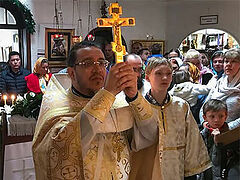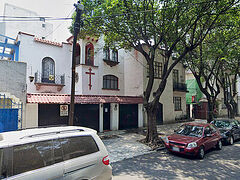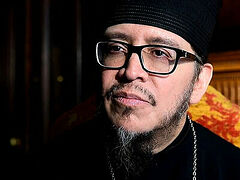Recently, a letter came from the Fund for Assistance to the Russian Orthodox Church Outside of Russia (ROCOR), which rather resembled a cry from the heart. It said that hundreds of migrants from Russia were now in Mexico, and no one was helping them—neither the Government nor charitable organizations. All these people, who naively want to get to the United States through Mexico, have only one path—to the Russian Orthodox mission, to the Holy Trinity Monastery in Mexico City. Its spiritual mentor, Fr. Nektary (Haji-Petropoulos), tries to take care of all newcomers, even though the mission itself is in dire need of support.
I thought that Fr. Nektary and I would have a usual conversation for fifteen minutes. But we talked for over an hour, and I felt that his heart was bleeding for those who have found themselves in a difficult situation far away from home, rather than for the mission. And only from the third or the fourth attempt did I manage to get the priest to talk about the mission’s needs—before that he kept talking on how refugees can be helped.
Perhaps his words will inspire some people to think and avoid such rash acts.
—Father Nektary, please tell us what is happening with the Russians in Mexico right now.
—Earlier, many Ukrainians who fled the war would come to us. But now Russians are coming, many of them. Some of them are also trying to flee the war, but they have other reasons too. Many strive to get to the USA, and they haven’t ended up in Mexico because they are going to stay here. Rather, they want to go to the USA, but they are coming to Mexico simply because it is quite easy to get here from Russia, especially from Moscow. Since we have a large border with the United States, people hope to get there.
Some told me that they did not agree with Russian policies and did not support the war. Many of them are young people and I guess they don’t want to fight. They have left their families in Russia, and some, who could afford it, have come with their wives and children.
These people think it will be easy for them to get refugee status and stay in the US if they say they are against the Russian government. They believe that in this case they will be immediately accepted; but they are mistaken.
 Archimandrite Nektary (Haji-Petropoulos) We know for sure that the United States does not accept Russian refugees, and it is very hard to get there from Mexico. I know this for a fact, because I have contacts in various organizations that help refugees at the border, including the UN and Catholic organizations. Sometimes I ask them to help our people, but each time it becomes more and more difficult, because they simply do not have the opportunity to do it. I managed to arrange accommodations for some in shelters opened by Catholics, Quakers or other religious organizations, but not by the Mexican Government.
Archimandrite Nektary (Haji-Petropoulos) We know for sure that the United States does not accept Russian refugees, and it is very hard to get there from Mexico. I know this for a fact, because I have contacts in various organizations that help refugees at the border, including the UN and Catholic organizations. Sometimes I ask them to help our people, but each time it becomes more and more difficult, because they simply do not have the opportunity to do it. I managed to arrange accommodations for some in shelters opened by Catholics, Quakers or other religious organizations, but not by the Mexican Government.
When Ukrainians started coming to us, the Mexican authorities supported them in every possible way and opened shelters. But there is nothing like that for Russians. I talked with Catholic monks because I have friends among them and it is the major religion in Mexico. But it is very hard to give refuge to Russians there because of the huge number of refugees in general: there are thousands of them from Central America, Asia, China, Arab countries, Pakistan, Afghanistan, Ethiopia...
In general, it is really very difficult for Russians to find shelter, and they are coming to our church for help. Of course, we are unable to provide them with any significant support. True, we can accommodate them for a while, give them some food and clothing. But nothing more.
Most of these people hope to get to the border as soon as possible. It takes two days to get from Mexico City to the Tijuana-San Ysidro border crossing by bus. It is long, expensive and dangerous, because at any moment they can be stopped and interrogated by the police or immigration officers. True, these people have Mexican visas and are here legally, but there are so many of them that it is very hard to get to the border.
And when they do get there, they wait in line for twelve to fifteen hours, only to talk to the immigration officer and be immediately denied entry! Many queue up again and are denied entry again—for the second time in a day! And if they have nowhere to stay for the night, or if they have no money, they can fall into the clutches of bandits who promise to smuggle them into the US, but they will simply rob them or beat them up, and as a result such people end up on the street without money, without documents and without help.
I speak to many of these people every day. Mexico City is far from the border, but there is no one to help them there—they only have our mission. There are only a handful of Orthodox churches in Tijuana, along with an Orthodox shelter, but these are Greeks, and they do not help. I have even tried to ask the Orthodox churches in San Diego in the USA to help refugees, as I know priests from other Orthodox jurisdictions there. But to no avail: they are overwhelmed by the huge number of refugees coming to America and literally screaming for help.
Sometimes the US accepts Russian refugees. But I would say that out of fifty applicants only one succeeds. I am always concerned about the fate of these people. They are coming to our church every day and begging, “Father, help!” Sometimes they come to the Sunday Liturgy, for confession and Communion, and say, “Father, bless us—we are going to the border.”
I answer, “Of course, I bless you. But it’s dangerous, so please don’t go there. You will fall into the mafia’s hands, and they will take everything from you! How will you get back?!”
Of course, we helped some of them return to Mexico City. And once here they decided to return to Russia. People realized that it was better to go home than to chase this stupid and false American dream.
Sometimes I get the following text messages: “Father, my application has been accepted, and I am in the USA.” But in most cases, I simply lose contact with those who have gone to the border. Indeed there are so many of these people that it is impossible to remember them all. This is our situation.
—How many Russians have you received in recent months? Hundreds?
—Yes. For example, about 300 in March and about 150 in April. I would say that dozens of people are coming to us weekly.
—What do you need to help them? And what kind of help does the mission itself need to be able to support these poor people?
—I would say that they are all seeking a lodging for one or two nights at the most. Sometimes I ask Catholics if they have space for one, two or three people. If they need to be accommodated for a few days, they may agree; but if more, then, as a rule, they refuse.
Some ask for money and food. I tell them, “We are unable to provide you with long-term material support. I am glad to give you some money, but it will be enough for one or two days, and this will not really help you. Instead, I’ll try to find you a place to stay and pay for some food.” But believe me, it is getting harder and harder to do this, because there are thousands of refugees in Mexico City. There are too many of them, and all the shelters for them are overcrowded.
More people ask for clothes. Our parishioners collect parcels and we deliver them. We give all we can give. Some get sick and we provide them with medicine. Of course, we pray for these people, but we are unable to provide them with long-term material support. Our monastery is small, and we struggle to make both ends meet.
The Lord takes care of us, but it is very sad to see what is happening now. Undoubtedly, everyone understands that Ukrainian refugees need aid. But Russians need it too. We care about all Orthodox people, not just individual ethnic groups.
—What kind of support does the mission itself need to help those in need?
—It is a very tough situation for us, because we do not want to get involved in any illegal affairs. But a huge number of migrants is the reality of our days, and the Mexican Government does not impede this.
It astounds me that some refugees buy a single ticket from Russia to Mexico and have no money left. If you are going to travel to another continent, you must have something in your pockets. However, many people tell me that they didn’t have time to save up, or that they can’t access their bank accounts in Russia.
Sometimes there are priests of the Russian Orthodox Church among the refugees. It is a very sensitive subject and it would be wrong of me to go into details. They ask for help too, and we do our best to support them. In some cases, representatives of ROCOR asked me to help them, and we paid for them, arranging for them to be transported to the border. However, no one has ever refunded our expenses.
Several times, when refugees from Ukraine started arriving in Mexico, the Fund for Assistance to ROCOR offered us help. But the Government took care of them, and they did not need money. These people asked me for spiritual support.
However, some Ukrainian organizations rejected us outright: “You are from the Russian Church, and you are our enemies! We do not want to have any dealings with you!”
I told them, “All right. All of you who want to come to church, come, please, please, please! We will give you spiritual support, comfort you and do everything that is needed.” But we cannot work with these Ukrainian organizations, because they consider us part of the problem. Although that is not the case!
At that time I thanked our Fund, but refused their help. Now they are asking again: “Father, can we send you money?” But this is a difficult question, because if I receive financial aid from the Fund, everyone will immediately know about it, and even more people will be coming to us—not only Russians and not only Orthodox. I have no idea what to do—we simply do not have the human resources for large-scale projects. And I don’t think that our mission or the Western American Diocese of ROCOR will have the capacity to open a shelter for refugees. Under the current conditions, we are perceived as a Russian organization, and many government structures do not help us. And they don’t care about refugees from Russia either.
We do what we can and as much as we feel we can. Sometimes we give what we ourselves need to survive—we share everything. And other monks ask me, “Father, what should we do?”
I answer, “Don’t worry. The Lord will help us. If we take care of our flock, He will take care of us.”
—And yet, regardless of the situation with migrants, what does the Russian Orthodox mission in Mexico need? How can people help you?
—First of all, we need your prayers and moral support, because we feel isolated. We are not affiliated with any other Orthodox jurisdictions here and feel lonely. Yes, we represent ROCOR, but many people believe that since we are “Russian”, we are their enemies.
Of course, we need financial support—but not for ourselves. Every time I tell people, “If you donate to the monastery, then this money does not go to feed the monks. We all have secular jobs and receive salaries, and thus make a livelihood. What you donate goes to our Orthodox community. All we receive is help for refugees and those in need.” We personally do not need anything—the Lord gives us means of subsistence, and this is enough. But we need resources to help refugees.
—What lesson can we learn from the refugee crisis?
—All those days, especially during Great Lent, I kept telling people, “Please, please, please! Give others what you have, share with them. God is very generous to us, and we can always share with those in need. After all, our Lord Himself was a ‘Refugee’ in His earthly life; He had to go from one place to another, and we must understand that we can also find ourselves in such a situation, become refugees—without homes and families. Whether we like it or not, whether we expect it or not, it can happen to anyone. Therefore, we must be generous, kind and compassionate. We must feel the suffering of these people. They need help—and we can share what we have with them. Even if it is just a tiny bit, we can always sacrifice something.”
Sometimes people ask me, “Father, how much should I give?” And I answer them, “Give as much as you feel you can. Then it will be a sacrifice. If you give leftovers, a surplus, then you do not give enough. But if it affects your wallet, if you deny yourself some food for this, then you are doing the right thing.”
—As I listen to you I feel your heart bleeding.
—It is so.
—How to survive in such a situation?
—All those days, especially during Holy Week, I was crying. I was reading the Gospel passages about the Passion of our Lord and weeping. I felt that I was surrounded by a huge number of people who did not have food and lodging, who were in a difficult situation and needed help.
But then—it was on Holy Friday—I felt that I must be strong. I am a helper of the Shepherd of these people and must guide, support and help them. And if it hurts me, then I must not show it, otherwise they will feel my weakness, and this will bring them to despair. They will decide that they have no hope. I should show them that I am strong, that we must keep our faith and our lives. We have hope, and the Light of Christ’s Resurrection will lead us in the right direction. And even if today we have nowhere to lay our heads (cf. Mt. 8:20), if we are hungry, we should believe that the Lord will take care of us, and maybe tomorrow the situation will improve.





